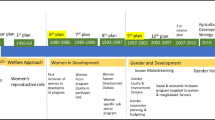Abstract
Ravula Padmaja and Ma Cynthia Serquina Bantilan draw lessons from gender-based social analysis at International Crops Research Institute for the Semi-Arid Tropics with a particular focus on agriculture. They look at agricultural technology development through a social lens, reflecting on the growing need for a holistic, impact-oriented approach to integrated aquaculture and agricultural research for development based on innovation and cooperation.
Similar content being viewed by others
Notes
ICRISAT's VLS ran in rural India from 1975 to 1985 and restarted in 2002 and have been an unparalleled source of information to inform development strategies for the region and to truly transform development economics and development studies more broadly. In 1975, six Indian villages, namely Aurepalle and Dokur in Andhra Pradesh, and Shirapur, Kalman, Kanzara and Kinkheda in Maharashtra, were selected by ICRISAT as the starting point for this initiative. The VLS was subsequently extended to Burkina Faso in Africa. The main purpose of VLS was to understand the socioeconomic conditions of people living in the SAT. This socioeconomic and agrobiological exercise culminated in a landmark database on rural households in the SAT of India and West Africa. For more detailed information on VLS log on to http://www.icrisat.org/gt-mpi/knowledgeBase/Databases/vls.asp.
References
Bantilan, Ma Cynthia S. and Ravula Padmaja (2008) ‘Empowerment Through Social Capital Build-up: Gender dimensions through technology uptake’, Experimental Agriculture 44 (1): 61–80.
FAO (2007) The State of World Fisheries and Aquaculture-2006, 180 pp. Rome: Food and Agriculture Organization of the United Nations.
International Food Policy Research Institute (IFPRI) (2005) Women Still the Key to Food and Nutrition Security, Washington, DC, USA: IFPRI.
Kolli, Rama Devi and Nand Kishore Sanghi (1994) ‘Gender Analysis of Technologies in the Indian SAT Agriculture’, Paper given at a workshop in National Academy of Agricultural Research Management, Rajendranagar, Andhra Pradesh, India.
Kolli, Rama Devi and Ma Cynthia Serquina Bantilan (1997) ‘Gender-Related Impacts of Improved Agricultural Technologies: Identification of indicators from a case study’, Gender Technology and Development 1 (3): 371–393.
Padmaja, Ravula, Ma Cynthia Serquina Bantilan, Devanathan Parthasarathy and Bhavanirajan Valentine Joseph Gandhi (2006) ‘Gender and Social Capital Mediated Technology Uptake’, Impact series 12. Patancheru 502 324, Andhra Pradesh, India: International Crops Research Institute for the Semi-Arid Tropics, 48 pp.
Parthasarathy, Devanathan and Vishwanath Kisan Chopde (2000) ‘Building Social Capital: Collective action, Adoption of Agricultural Innovations, and Poverty Reduction in the Indian Semi-Arid Tropics’, Paper given at ‘Second Global Development Network’ conference, Tokyo, Japan, 11–13 December.
Sullivan, Leah (2005) The Impacts of Aquaculture: Development in Relation to Gender in Northeastern Thailand, Bangkok, Thailand: Asian Institute of Technology.
Walker, Thomas and James Ryan (1990) Village and Household Economies in India's Semi-Arid Tropics, 394 pp, Baltimore, MD, USA: Johns Hopkins University Press.
Williams, Meryl J. (2004) ‘World Fish Supplies, Outlook and Food Security’, in Alan Gordon Brown (ed.) Fish Aquaculture and Food Security – Sustaining Fish a Food Supply, Crawford, Australia: Gippsland Aquaculture Industry Network.
World Bank (2001) Social Analysis Source Book, Washington, DC: The World Bank.
Additional information
Draws lessons from gender-based social analysis at ICRISAT with a particular focus on agriculture
Rights and permissions
About this article
Cite this article
Padmaja, R., Bantilan, M. Gender Issues in Aquaculture: Learning lessons from the International Crops Research Institute for the Semi-Arid Tropics. Development 51, 271–277 (2008). https://doi.org/10.1057/dev.2008.21
Published:
Issue Date:
DOI: https://doi.org/10.1057/dev.2008.21




